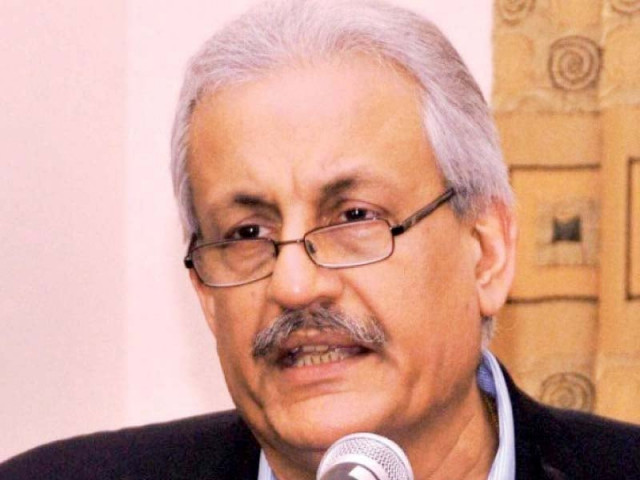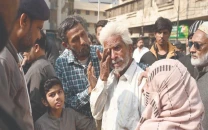Pakistan owes democracy to struggle of unknown political workers
The All Sindh Debate Competition was held to honour Fatehyab Ali Khan

Raza Rabbani. PHOTO: FILE
"The history that is taught is not Pakistan's. It has been changed by people like Ziaul Haq to suit a particular school of thought. Portions of the democratic struggle of people like Fatehyab Al Khan are missing from our books as only the elite class is glorified," he claimed.
"It is because of the struggles of unknown political workers like Fatehyab that we have the crippled form of democracy," Rabbani explained. What can I complain about when I am ignorant of my own history and when we are told our culture is Arab and not Sindhi, Balochi or Punjabi? Where will ownership and nationalism come from then? he questioned.
The Senate chairperson was speaking at the Federal Urdu University on Wednesday morning as students, faculty members, civil society and representatives of the government gathered to commemorate the late Fatehyab Ali Khan in an All Sindh Debate Competition.

Fatehyab Ali Khan was known for his struggle for democracy in Pakistan and was the founding member of the Movement for the Restoration of Democracy (MRD). Formally an advocate, he was also the first president of the Karachi University Students Union in 1960 and chairperson of the Inter-Collegiate Body (IGB).
Rabbani vehemently stressed that nationalism will only come about when the people, the farmers and working class, own Pakistan. "It will happen when a farmer will feel that he's part of the power," he said.
"We demand that a national commission be formed that takes into account the history of poor and working class people and makes it part of the curriculum," said Rabbani.
"Today we don't have exemplary leaders such as Fatehyab among us. In his view democracy was not a political activity, but rather a social activity," said the vice-chancellor of Ziauddin University, Pirzada Qasim, while sharing his memories of Fatehyab in the 1960s. "At that time, leadership qualities were transferred through people like him. Today, what are the people to learn from us? Are we even able to transfer [those qualities]? This is a grave issue," he said.
President of the Awami Workers Party, Yousuf Masti Khan, said that Fatehyab is in fact, the name of a movement and an institution. "His struggle was towards bringing change in society. Despite MRD, we could not decide the direction of the country. It is because of the contradictions in the Constitution that we are the way we are," he said.
Dr Masooma Hasan, president of the Aurat Foundation and wife of Fatehyab Ali Khan, said that his honesty in politics was rare. "He was committed to ideology and a consensus builder. He went through a lot in his struggle but never bowed down in front of anyone," she said.
Students voiced their points of view in fiery sessions of speeches amid a competitive atmosphere on the subject, 'Hum ne roshan kiye zehnon main chiragh' [We enlightened minds]. While some praised the brilliant minds of the country by exemplifying Malala, Samina Baig and Ayesha Mumtaz of the Punjab Food Authority, others blamed social media and misplaced heroism of celebrities in universities for the decline of the country's thought process.
Rabbani's take on NAB
"I admit that my class and political workers were involved in corruption. I don't defend them. But I am here to tell you that the rest of Pakistan is not clean either," he said. "Accountability should be done for everyone, across the board," he said.
"It will no longer be tolerated that special courts are made only for those who have a political ideology. If I am to be tried, even though I'm not corrupt, I should be tried by my peers. If there will be a trial of modern class in special courts, then all classes should be tried in these courts too," he said.
On the National Accountability Bureau (NAB), Rabbani said that there is a need to watch over the laws of NAB. "The department that is accountable for the entire Pakistan, who will hold it accountable?" he asked. He suggested that civil society and academia should be involved to form a watchdog committee for the accountability of NAB. "It's nothing new, it happens everywhere in the world," he said.
Published in The Express Tribune, October 1st, 2015.



















COMMENTS
Comments are moderated and generally will be posted if they are on-topic and not abusive.
For more information, please see our Comments FAQ